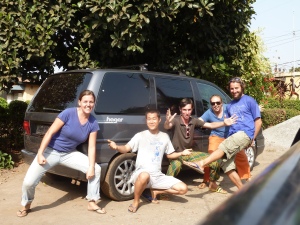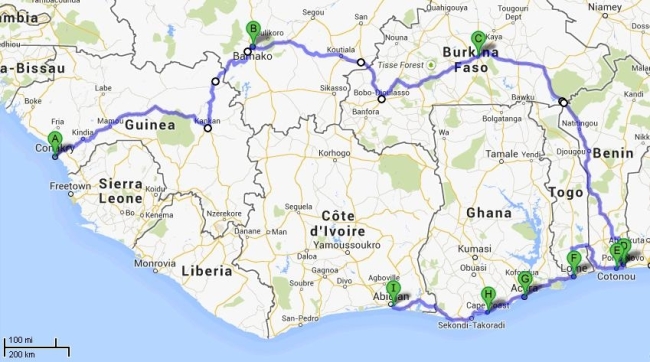Above is an anecdote PC volunteers like to say. It can be comforting at times and depressing at others to know that if you sleep for long enough, you could essentially half the amount of time of conscious PC service. Just food for thought.
I am only a few weeks away from officially hitting the halfway point in my service—1 year spent at site and 1 year left (Si Allah djabi, God willing). It’s a crazy thought that I’ve been here for that long and I’m starting to realize that one more year is not that much time to attempt to accomplish everything that I want to. As I hit my year mark, a new stage of extension (Public Health and Agroforestry) trainees are being sworn in as new volunteers and being dropped off at their sites for the long haul. It gets easier…kind of. 🙂
Before heading to the forest region of Guinea for Christmas, I spent my time at site continuing my training sessions on project design and management for a group of community leaders. We are slowly making our way through the various steps of designing and implementing a community project, including creating goals and objectives, a budget, a monitoring and evaluation plan, etc. The hope is that by the end of our training sessions, the chosen community leaders will be able to plan and undertake community projects on their own with me in the background for support but not in charge. It’s going well so far and I really appreciate their commitment and enthusiasm.
I also wrote and submitted a small grant proposal for the environmental education club at the local middle school. My counterpart and the teacher representative for the club were both big helps in drafting the proposal.
I was able to start my dry season garden by planting in the communal women’s garden in the Fello neighborhood of my village. I planted potatoes, garlic, onion, carrot, cabbage, kale and beet, and lined my bed with marigold flowers to help deter pests. Everything but the onion and cabbage have sprouted, and those were both pretty old seeds so not unexpected. I still have a lot more seeds I want to plant, including experimenting with lentils, quinoa, broccoli and cauliflower, so I hope to get a hold of more space to plant soon.
I’m still working to help organize the beekeepers who work in the area. Soon I plan to start a series of trainings on different topics: how to build Kenyan top-bar hives, basic bee biology and colony characteristics, and how to make beeswax candles. Should be exciting!
As mentioned earlier, I recently spent the holidays visiting the forest region of Guinea with a group of volunteers. I had an amazing time hiking Mount Nimba (the highest peak in Guinea), seeing traditional mud cloth being made, watching wild chimpanzees in the forest and visiting a vine bridge that crosses crocodile-infested waters. Our ordeal to get the necessary permit to hike Mount Nimba took days and then our first guide turned out to be useless—“oh, by the way, I haven’t climbed here for 10 years so I don’t know where to start the hike…” We finally started the 8 hour trek at noon and as a result practically ran up the mountain to make it back down in time. Our last hour of hiking was in the dark—NOT recommended. But the forest was beautiful on the way up and you can see into Guinea, Liberia and Cote d’Ivoire from the top. During one of our rest stops, my friend accidentally was crouching on top of a small viper. One of our guides quickly stepped in and decapitated it with his machete. He kept the body to eat for dinner; I got a picture of him with his prize (on facebook). Mud cloth is a fabric traditionally made in the forest region by dyeing the cloth in a dye made from a certain tree bark. It comes out this deep brown, hence the name. On Christmas Day, I went to visit a family who make the cloth in their backyard and bought some. They lived right next door to the Catholic Mission so I got to hear the beautiful music of singing, djembes and beaded gourds pouring out of the church. Side note: The forest region is the only region in Guinea that is predominantly Christian. One result of this fact is that people drink alcohol more openly then in Muslim areas. In particular, they drink a lot of palm wine that is made locally EVERYWHERE.
In a small town called Bossou not far from Mount Nimba, there are wild chimpanzees that live in the forest and are monitored and studied by researchers through a joint program between the Guinean government and Kyoto University in Japan. I paid US $70 to be able to climb through the forest with 2 guides and watch the chimps go about their business. Of that $70, 50% goes to the community of Bossou, 30% goes to the researchers and 20% goes to the guides. We started hiking to the forest with my guides radioing their co-workers on the walkie talkie to figure out the current location of the chimps. Within 20 minutes, I heard the chimps calling to each other and then a giant male came strolling past within 5 feet of me! He would meander for a bit, then sit down and look up into the trees for fruit, then get up again. We would follow close behind him, and twice I got to see him run up to a tree and pound its giant roots/trunk with his feet. It’s a way of communicating with the other chimps. It was so comical how stereotypical their calls are—OO OO OO then EEH EEH EEH! While we were following him, he met up with his mom and another male before climbing up into this HUGE banian tree, probably 50 feet tall. The whole thing was a magical experience.
Another day we drove to a village about an hour from the regional capital, N’zerekore, to visit a vine bridge. The bridge spans a pretty big river and as you can infer, is made entirely of vines woven together and attached to trees on both banks. The foot path on the bridge was barely wider than my foot and the railings came up high on both sides of me, maybe to my chest, so you felt somewhat secured in while you walked across. Our guide from the nearby village explained that they had to rebuild the bridge every year, which takes 3 weeks. They gather a special kind of vine from the forest which is getting more difficult to find as the human population expands and cuts down more forest each year. When asked how they managed to attach the vines onto the highest branches some 50 feet above, he said that the water demon did that part. Every year the water demon attaches the highest vines and that signals to the villagers that it’s time to start the rebuild of the bridge again.
One day while our group was in N’zerekore, three of us decided to find the cyber café in town. While we were walking there, we passed a construction supplies shop with two Lebanese guys in front of it. Lebanese men are a pretty familiar site in major Guinean cities, so I didn’t think much of it. As we were passing by, one of them signaled us over and introduced himself. Ali was probably in his 40s, with thinning hair and a big belly. He was so eager to talk to us and sent one of his employees to buy us cold cokes. It only took him a few minutes to invite us to his house for dinner. We thanked him but politely declined, explaining that we were part of a group of 11 people. He paused for a moment and then said, “No problem, I’ll order a whole carton of chicken. Everyone’s invited!” We went to the cyber café to use the internet and then Ali showed up when he was done with work to give us a ride to his house in his BMW X5. We go tearing through the city in his car with Lebanese music blaring through the speakers. We make a stop at a house and Ali calls someone on his phone and tells them he’s outside, bring the package. Now I’m thinking, am I such a broke starved volunteer that I accepted an invitation for a free chicken dinner from a Lebanese mob boss? A guy approaches the car, Ali rolls down my window and the guy hands off a plastic bag full of cash. You know, totally normal. My face instantly betrays me, because the guy starts laughing and asks if I’m scared. Oh no, I assure him, not at all. We take off and head to Ali’s house, where we sit on his patio drinking tea and smoking hookah for hours while an amazing feast is prepared for us: barbecued chicken, salad, French fries, pita bread, baguettes and cold cokes. Ali and his brother laugh at how ravenous we all are and keep throwing more chicken and fries on our plates. “Oh no, I couldn’t!…Well, if you insist.” We stuffed ourselves silly. Ali and his younger brother found us very entertaining. They could not believe it when we told them we only make around 1 million Guinean Francs per month (about $150). They were stupefied. Ali’s younger brother, who was in his mid 20s, looked uncannily like a former response volunteer in Guinea so we started calling him Lebanese Danny. We were half convinced it was Danny playing a prank on us and he would reveal himself at any moment. Ali told us that the reason he flagged us down in front of his shop in the first place was because Lebanese Danny had seen me walking by and wanted a reason to talk to me. He was sitting on his motorcycle with 2 million Francs (don’t ask, mob bosses…) and supposedly chucked the money into the bed of their work truck and shouted to Ali “She’s looking for a taxi! I can be a taxi moto!” Not to make too fine a point, team, but I’d like the record to show that I was instrumental in securing us a fabulous Lebanese chicken dinner. Ali had on this ridiculous lime-green, fitted shirt on that read “Nobody’s perfect except for the captain.” The collar had been cut lower and his chest hair popped out the top. Winning. Two guys in our group were eyeing the shirt and then one of them asked if he could have it. Outraged that he beat him to the punch, the other guy protested. We all decided they should arm wrestle for it. We cleared the table for them and as they started, half of us chanted “ME-XI-CO”, encouraged by Ali, for our Mexican-American friend while the other half chanted “FRANCE” for our half-French friend. It was hysterical. It was unclear who won, so we all had to vote for the winner. France was the victor. But then Ali felt bad for Mexico so he went into the house and got him a different shirt. He was feeling so generous, even I got a shirt and a hat out of the deal. Then to further prove how starved for Western food we are, we all went crazy when Lebanese Danny said he could find us pizza in N’zerekore. We were all stuffed from dinner, but still found the enthusiasm to chant for pizza. It went a little something like this… Lebanese Danny: “You guys want pizza?” Us: “YE-AH!!” Lebanese Danny: “Who wants pizza?” Us: “WE DO!!!” We’re all such fat kids at heart. That night was so hilarious and surreal, I still can’t quite believe it all happened.


